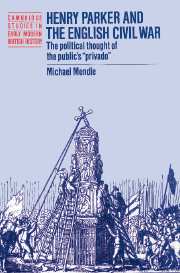Book contents
- Frontmatter
- Contents
- Preface
- Acknowledgments
- List of abbreviations
- 1 The public's privado
- 2 The ship money case and The Case of Shipmony
- 3 Religio laici
- 4 Observations and the political theory of the emergency
- 5 The Observator observed
- 6 “Vaine Confidence in the Law”: the Observator responds
- 7 Diverse urgent emergent considerations
- 8 Disputable and visible politics
- Conclusion: contrary points of war
- Appendix: The writings of Henry Parker
- Index
- Cambridge Studies in Early Modern British History
8 - Disputable and visible politics
Published online by Cambridge University Press: 08 October 2009
- Frontmatter
- Contents
- Preface
- Acknowledgments
- List of abbreviations
- 1 The public's privado
- 2 The ship money case and The Case of Shipmony
- 3 Religio laici
- 4 Observations and the political theory of the emergency
- 5 The Observator observed
- 6 “Vaine Confidence in the Law”: the Observator responds
- 7 Diverse urgent emergent considerations
- 8 Disputable and visible politics
- Conclusion: contrary points of war
- Appendix: The writings of Henry Parker
- Index
- Cambridge Studies in Early Modern British History
Summary
Parker's return from Hamburg led him back to the press, now as a defender of the commonwealth; he grew particularly close to Henry Ireton. Apart from a brief and unilluminating recounting of Irish affairs early in 1652, Parker published three major tracts after the king's execution and the declaration of the commonwealth, all within seven months in 1650–1. Whatever they intended to do, they must serve as his valedictory.
A Letter of Due Censure and Redargution was Parker's response to the treason trial of John Lilburne in October 1649, which was only marginally less dramatic than the king's. For Lilburne the trial was perhaps too many things at once – a publicity opportunity for his cause, an exercise in persuasion of the jury, an opportunity to free himself from an extended captivity, and, withal, a very real threat to his life. His acquittal led to a chaotic scene in the Guildhall (where he was tried), and street celebrations thereafter. This moment of challenge for the commonwealth regime was extended when, two months later, the trial transcript was published. Parker, who was not an eyewitness, relied on this full and entirely sympathetic account, which was written by Lilburne's royalist friend, Clement Walker.
- Type
- Chapter
- Information
- Henry Parker and the English Civil WarThe Political Thought of the Public's 'Privado', pp. 160 - 179Publisher: Cambridge University PressPrint publication year: 1995



